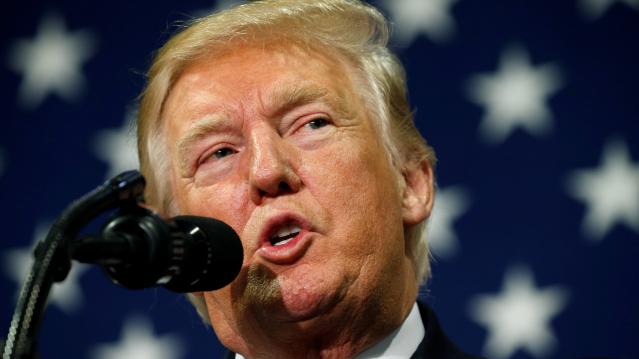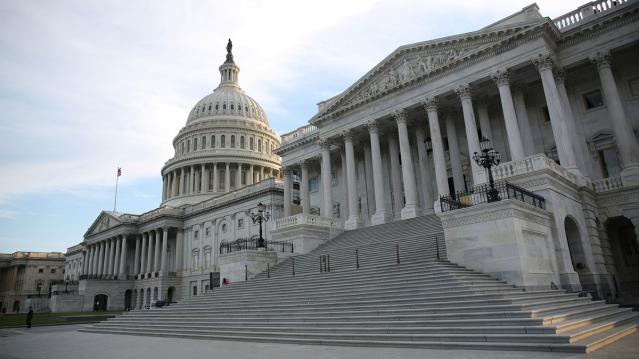Deficit Jumps in Trump’s First Fiscal Year

The federal budget deficit rose by 16 percent in the first nine months of the 2018 fiscal year, which began last October. The shortfall came to $607 billion, compared to $523 billion in the same period the year before, according to a U.S. Treasury report released Thursday and reported by Bloomberg. Both revenue and spending rose, but spending rose faster. Revenues came to $2.54 trillion, up 1.3 percent from the same nine-month period in 2017, while spending came to $3.15 trillion, up 3.9 percent.
Where Trump Will Compromise on Tax Reform

White House officials tell USA Today’s Heidi Przybyla that President Trump will include a number of compromises to limit his tax plan’s benefits for the wealthy when he promotes the blueprint next month:
“The compromises will include ending a 23.8% preferential tax rate for hedge-fund managers, or the so-called carried interest rate, White House legislative affairs director Marc Short told USA TODAY. … Retaining parts of a state and local tax deduction that benefits many middle-class families in blue states is also an area where Trump is expecting compromise.”
Trump campaigned on raising the carried interest rate, saying its beneficiaries are “getting away with murder.” But changes to the carried interest rate may run into opposition from House Republicans, and the tweaks appear unlikely to win any Democratic support.
Larry Summers Savages Trump Tax Plan Analysis
Former Treasury Secretary Larry Summers made his distaste for the Trump administration’s tax framework clear last week when he said Republicans were using “made-up” claims about the plan and its effects. Summers expanded his criticism on Tuesday in a blog post that took aim at the report released Monday by the Council of Economic Advisers and chair Kevin Hassett, which seeks to justify the administration’s claim that its tax plan will result in a $4,000 pay raise for the average American family.
Never one to mince words, Summers says the CEA analysis is “some combination of dishonest, incompetent and absurd.” The pay raise figure is indefensible, since “there is no peer-reviewed support for his central claim that cutting the corporate tax rate from 35 to 20 percent would raise wages by $4000 per worker.” In the end, Summers says that “if a Ph.D student submitted the CEA analysis as a term paper in public finance, I would be hard pressed to give it a passing grade.”
One of the authors cited in the CEA paper also has some concerns. Harvard Business School professor Mihir Desai tweeted Tuesday that the CEA analysis “misinterprets” a 2007 paper he co-wrote on the dynamics of the corporate tax burden. Desai’s research has found a connection between business tax cuts and wage growth, but not as large as the CEA paper claims. “Cutting corporate taxes will help wages but exaggeration only serves to undercut the reasonableness of the core argument,” Desai wrote.
For Tax Reform, It May Be 2017 or Bust
National Economic Council Director Gary Cohn said Monday that tax reform has to happen this year, even if it means Congress has to stay in session longer. "I think we have a unique window in time right now, but unfortunately we keep losing days to this window,” he said. “The opportunity is now." House Speaker Paul Ryan said last week he’d keep members over Christmas if that’s what it takes. And Ryan predicted Monday that tax reform would pass the House by early next month and then get through the Senate to reach the president’s desk by the end of the year. But there are plenty of skeptics out there, given the hurdles. Issac Boltansky, an analyst at the investment bank Compass Point, told Business Insider, "The idea of getting tax reform done this year is a farcical fantasy. Lawmakers have neither the time nor the capacity to formulate and clear a tax reform package in 2017."
Do Republicans Have the Votes for the Next Step Toward Tax Reform?

Passing a budget resolution for 2018 through the Senate will open a procedural door to a $1.5 trillion tax cut over 10 years. The resolution is expected to reach the Senate floor this week, although there are questions about whether Republicans have the 50 votes they need to pass it. Sens. Susan Collins (R-ME) said this weekend that she would vote for it and Lisa Murkowski (R-AK) is likely a “yes” as well, but Sen. Rand Paul (R-TN) is reportedly a likely “no” and John McCain (R-AZ) appears questionable. Now it looks like Sen. Thad Cochran (R-MI) won't be back in Washington this week to vote on the resolution due to health problems. The Hill says Cochran’s absence puts tax reform “on knife’s edge.”
Quote of the Day - October 16, 2017
Speaking at a cabinet meeting on Monday, President Trump said:
"Obamacare is finished, it's dead, it's gone ... There is no such thing as Obamacare anymore."
Click here for the video.
